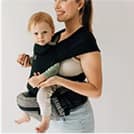Overstimulated Baby: Signs, Tips and How to Prevent It
Written by Connor Bringas on December 29, 2022.
When your baby’s cries go from mildly dramatic to a full-blown Oscar-worthy meltdown, you’ve probably got an overstimulated baby on your hands.
Sometimes, recognizing the signs of overstimulation can feel like chasing a moving target. From fussiness that quickly escalates to rapid, jerky movements, spotting an overstimulated baby is about knowing the signs before things go full tilt.
Table of Contents
- What is Overstimulation in Babies?
- 5 Signs of an Overstimulated Baby
- How to Calm an Overstimulated Baby
- Prevention: How to Avoid Overstimulation
What is Overstimulation in Babies?
An overstimulated baby is one whose tiny brain has hit its limit on sights, sounds, and all the chaos life throws their way.
Overstimulation can occur when too much is happening at once—but what is overstimulating for babies? Anything overwhelming can cause overstimulation in babies, whether it’s a crowded room, loud noises, or non-stop attention from well-meaning relatives. Other factors like screen use, tiredness, and a disruption in their daily routine can also contribute to baby overstimulation.
Understanding what baby overstimulation looks like and how to calm it can make all the difference between a meltdown and a moment of calm.
5 Signs of an Overstimulated Baby
Babies, like us, can only handle so much before their little brains go into overdrive. Signs like jerky movements, temper tantrums, and extreme tiredness can all signal it’s time for a sensory break.
The world is exciting, but for a baby, sometimes it’s just too much too soon. So, how do you know when your baby has hit their limit? Here are five telltale signs of being overstimulated so you can tell when your little one’s had enough and needs a break.
1. Wanting to be Held
When your baby suddenly becomes glued to your hip and is desperate to be held, it’s a classic sign of baby overstimulation.
The comfort and security of your arms help block out overwhelming sights and sounds, so if your little one won’t settle unless they’re nestled against you, it’s not just about needing a cuddle—it’s their way of hitting the reset button.
Holding an overstimulated baby isn’t always easy on the go—but the Tushbaby hip carrier and Snug attachment can help make it easier. The Tushbaby hip carrier creates a comfy, supportive perch for your baby to sit on while you carry them, while the Snug is an attachable wrap you can buckle to your Tushbaby for hands-free carrying.
This Tushbaby + Snug duo provides storage and support while keeping your hands free and your little one close—giving your baby the comfort they crave, and you the freedom you need!
2. Moving in a Jerky or Frantic Way
If your baby starts moving like they’re in a mini mosh pit—arms flailing, legs kicking, or any motion looking a little too jerky or frantic—it could be a red flag for overstimulation.
These sudden, sharp movements are your baby’s way of trying to cope with an overload of sensations. When you see those frantic little limbs, it’s time to step in and help your overstimulated baby find their calm.
3. Having Temper Tantrums
Temper tantrums are one of the key signs of overstimulation. These outbursts aren’t just about not getting their way—they’re a sign your little one is feeling totally overwhelmed.
With too much going on around them, their only way to express the overload is through tears, kicking, and a whole lot of noise. So when tantrums strike out of nowhere, it’s a sign to step back and simplify the environment.
4. Acting Very Tired
When your little one suddenly seems ready to conk out, even though it’s nowhere near naptime, this is a sure sign of baby overstimulation. Acting overly tired is their way of waving the white flag, signaling that all the noise and excitement has worn them out.
If your baby starts rubbing their eyes, yawning, or showing signs of exhaustion out of the blue, it’s time to help them wind down before things spiral into full-on crankiness.
5. Clenching Their Fists
If you’ve ever noticed your baby clenching their tiny fists like they’re about to throw down, they might be overstimulated. This is a natural reaction to stress and excitement, as their nervous system gears up to manage all the overwhelming sensations coming their way. If you spot those fists, it might be time to dial down the stimulation and give them a moment to reset.
How to Calm an Overstimulated Baby
When your baby’s world gets a little too loud and chaotic, knowing how to hit the reset button is key. Calming an overstimulated newborn isn’t about fancy tricks—it’s about going back to basics.
Whether it’s creating a quiet space, offering a comforting cuddle, or just taking a sensory time-out, there are tried-and-true methods that can help soothe your little one when they’ve hit their limit. Here are some top tactics to bring your overstimulated baby back to their happy place.
Hold Them
Sometimes, all your baby needs is to be held close. This is where the Tushbaby Hip Carrier shines—offering versatile carry positions to soothe your overstimulated little one.
With Tushbaby, those up-and-down moments are effortless too. You can easily switch from holding them close when they need comfort to letting them explore once they’ve calmed down—and all without the hassle of taking the carrier on and off. Easy transitions, happy baby.
Finding a Quiet Space
When you’re dealing with an overstimulated baby, sometimes the best remedy is a little peace and quiet. Find a calm, low-light space where the noise and chaos fade away, giving your baby a break from all the overwhelming stimuli. It’s like hitting the pause button on the world and allowing them to reset and find calm again.
Remove Stimulating Toys
Those flashy, noisy toys might be doing more harm than good. Too much stimulation, whether it’s blaring music or blinking colors, can overwhelm their developing senses and make it hard for them to process everything at once.
To help them calm down, try removing bright lights and loud jingles from their environment. Sometimes, less is more—especially when it comes to keeping your little one from hitting sensory overload.
Soothe with White Noise
White noise can be your secret weapon when your baby is on the verge of a meltdown. The steady, calming sound drowns out the chaos and helps create a soothing environment where your baby can relax.
Whether it’s the hum of a fan, a white noise machine, or even a gentle shushing, this simple trick can work wonders in bringing your overstimulated newborn back to a state of calm.
Swaddle your Baby
Swaddling is the practice of snugly wrapping a baby in a soft blanket to provide a sense of security and comfort, similar to the feeling of being in the womb. This can instantly soothe an overstimulated baby’s frazzled senses.
Swaddling isn’t just about keeping them cozy—it’s about creating a safe space where your baby can relax and find their peace again.
Keep a Pacifier Handy
Keeping your baby’s pacifier clean and in arm’s reach is a game-changer, especially when they’re overstimulated and need that special comfort. Tushbaby’s The Pod keeps their pacifiers clean and close by clipping onto your carrier or purse, so you’re not rummaging through a bottomless diaper bag at the worst possible moment. When your baby’s overwhelmed, having their pacifier handy can be the quickest way to soothe them.
Prevention: How to Avoid Overstimulation in Babies
Preventing your baby from getting overstimulated is all about balance. It’s not about avoiding fun, but instead knowing what is overstimulating for babies and when to tone things down.
By recognizing your baby’s limits and creating a calming environment, you can help them stay in their happy zone. A little planning and a lot of awareness go a long way in keeping the peace and preventing those major meltdowns.
With the right approach, you can help your baby enjoy the world around them—without it becoming too much.
Stick to a Feeding Schedule
Sticking to a feeding schedule is one of those little things that can make a big difference in avoiding an overstimulated baby.
A predictable routine helps keep your baby’s energy levels balanced, preventing those hangry meltdowns that can tip them over the edge. By keeping feedings consistent, you’re not just nourishing your baby—you’re also giving them a sense of stability that helps keep the overstimulation at bay.
Breastfeeding on the go can be a breeze with the Tushbaby Carrier. Its open-style design lets you nurse your baby comfortably as early as infancy, and seamlessly transition between carry positions on the go. The built-in lumbar support promotes proper posture while feeding, and the waistband even has storage pockets to hold all your essentials—no extra bags needed.
Whether you’re out running errands or exploring the great outdoors, Tushbaby makes it easy to maintain your little one’s routine and avoid an overstimulated baby, no matter where your day takes you.
Arrange Some Quiet Time
Building some quiet time into your baby’s day is important before things get too intense. Whether it’s a peaceful nap or just some low-key play, these breaks help your baby decompress and recharge. By making quiet time a regular part of their routine, you’re giving your little one the chance to unwind and get comfortable.
Avoid Excessive Screen Time
When it comes to avoiding an overstimulated baby, keeping screen time in check is a smart move. Those colorful videos might seem like a lifesaver when you need to get things done, but too much screen time can overload their senses and make it harder for them to wind down. By limiting screen exposure, you’re helping your baby stay grounded in the real world, where they can explore at their own pace without the risk of sensory overload.
Spotting the signs of an overstimulated baby is like learning their personal SOS. When you notice your baby hitting their sensory limit, the best thing you can do is dial it back. Find a quiet, cozy spot to help them decompress, and grab your Tushbaby carrier. It keeps them close, helps them feel safe, and supports you both—from birth to toddlerhood.
Soothe your overstimulated baby with some close, calming contact. Shop Tushbaby today!








Leave a comment